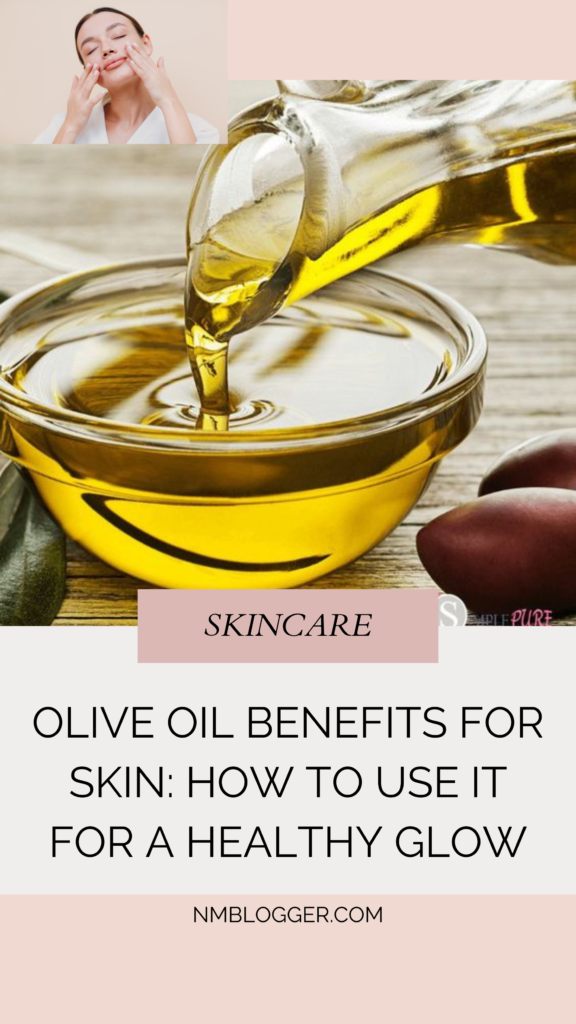Olive Oil Benefits for Skin: How to Use It for a Healthy Glow
Olive Oil Benefits for Skin: How to Use It for a Healthy Glow
Olive oil is widely recognized for its use in skincare and cosmetic products due to its antibacterial, antioxidant, and anti-inflammatory properties. It has been known to treat various skin conditions, such as eczema and psoriasis, and can be used both topically and through ingestion for its natural skincare benefits. Read on to discover the numerous benefits of olive oil for the skin and face and how you can incorporate it into your beauty routine.

Top Benefits of Olive Oil for Skin and Face
1. Moisturizing Properties
Olive oil contains essential fatty acids (EFAs), which are highly beneficial for moisturizing the skin. These healthy fats nourish, hydrate, and protect the skin’s natural barrier, leaving it soft and supple.
2. Anti-Inflammatory Benefits
Olive oil has long been used to treat wounds and skin infections due to its anti-inflammatory properties. It promotes wound healing and can be used for conditions such as diabetic ulcers, dermatitis, and even diaper rash.
3. Nutrient-Rich Composition
Extracted from the fruits of the Olea europaea tree, olive oil is packed with beneficial compounds like oleic acid, linoleic acid, and palmitic acid. It also contains more than 200 active compounds, including sterols and carotenoids, which nourish and support healthy skin.
4. Antioxidant Powerhouse
Olive oil contains antioxidants that are more powerful than vitamin E. These antioxidants can reduce inflammation and protect the skin from oxidative stress, helping to prevent premature aging and sun damage.
5. Anti-Aging Properties
Regular use of olive oil on the skin may slow down the aging process. Its antioxidant-rich formula helps prevent damage from UV radiation and delays the onset of wrinkles and fine lines.
6. Helps Soothe Skin Conditions
Olive oil may help manage skin conditions such as eczema, seborrheic dermatitis, and acne. Its moisturizing and anti-inflammatory properties make it an effective natural remedy for soothing irritated and inflamed skin.
7. Antimicrobial Properties
Olive oil contains hydroxytyrosol, a compound with strong antimicrobial effects. This makes olive oil an excellent treatment for various skin infections, protecting the skin from harmful bacteria and fungi.
8. Enhances Overall Skin Health
Olive oil hydrates and nourishes the skin, protecting it from UV damage and promoting overall skin health. Its oleuropein content helps to combat free radicals and improve skin texture and elasticity.
9. Treats Burns
A combination of olive oil, sesame oil, and honey has been shown to accelerate the healing of burns. This mixture can prevent infections, promote tissue repair, and speed up recovery.
How to Use Olive Oil for Skin
- Direct Application: Use olive oil as a natural moisturizer by massaging it onto the skin in gentle circular motions.
- Mix with Skincare Products: Add olive oil to your existing skincare products, such as moisturizers and face masks, for an added boost of hydration.
- DIY Face Masks: Combine olive oil with other natural ingredients like lemon juice, green tea, or honey to create a nourishing face mask.
- Carrier Oil: Use olive oil as a base for blending essential oils to enhance the skin benefits.
Olive Oil Face Mask Recipe
Ingredients:
- 1 tablespoon olive oil
- 1 teaspoon honey
- ½ teaspoon fresh orange zest
- 1 egg yolk (for dry skin) or egg white (for oily skin)
- Vitamin E capsule
Instructions:
- Mix olive oil, honey, and orange zest together.
- Add the contents of a vitamin E capsule.
- Beat the egg yolk (or egg white) into the mixture.
- Whisk until well blended.
- Apply the mask to your face and neck using your fingers or a brush.
- Leave it on for 20 minutes, then rinse with warm water, followed by cold water.
Risks and Side Effects
Olive oil is generally safe for the skin with no significant side effects. However, it is always a good idea to perform a patch test before applying it to larger areas. If you experience redness, irritation, or swelling, discontinue use immediately.
Conclusion
Olive oil is a versatile and beneficial addition to any skincare routine. Its antibacterial, antioxidant, and moisturizing properties help protect the skin and manage conditions like eczema and psoriasis. While olive oil can be an effective natural remedy for many skin issues, always consult with a dermatologist and conduct a patch test before incorporating it into your skincare regimen.